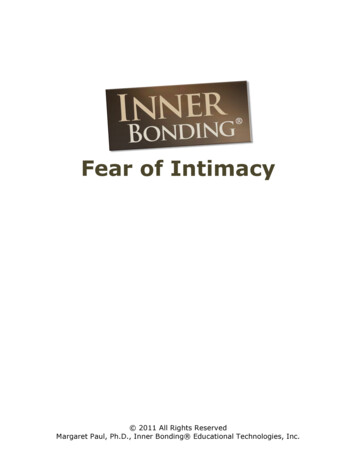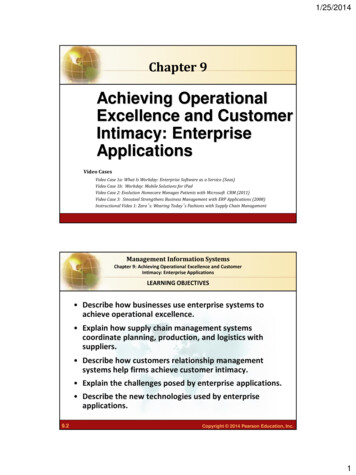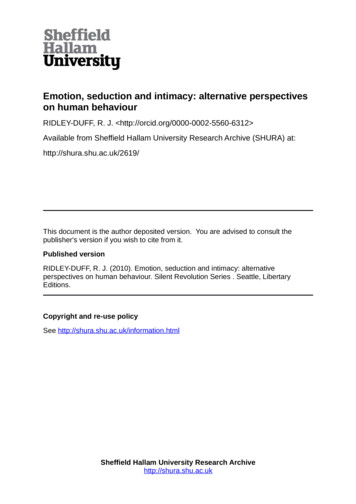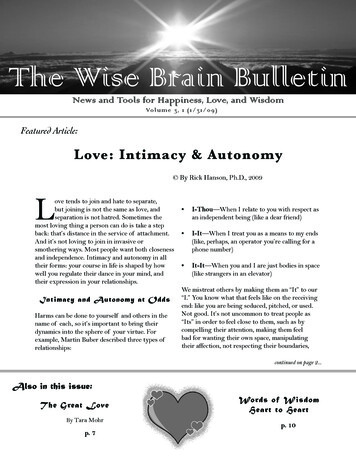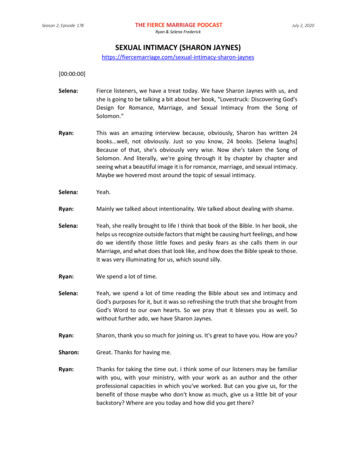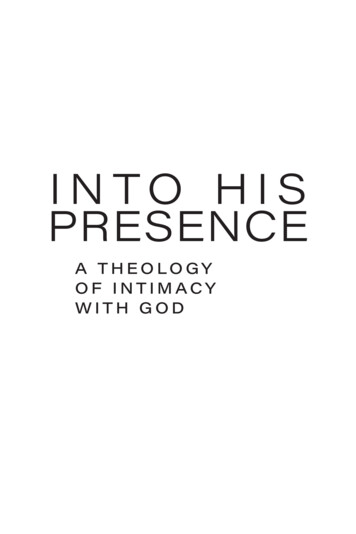
Transcription
AN INVITATION TO INTIMACYWHITE PAPERS CRITICAL CONCEPT SERIES VOLUME 2The reason for the Critical Concept series is that there are importanttopics not covered in our Transferable Concepts that are, for anynumber of reasons, of critical concern to us today.P OS TCA RDS F ROWHIM COTE RPAPIN TEHRS1Important concepts like this require more in-depth treatment, whichis a discipleship challenge when so few are reading books. And so wehave the Critical Concept series. Each article is roughly the lengthof a book chapter-about 16 pages. So it’s not a book, but it’s not apamphlet either.ORDER ONLINE AT CRUPRESS.COM 2010, CruPress, All Rights Reserved. CruPress.com
Critical ConceptSeriesV O L U M ET W OWHITEPAPERSAN INVITATION TO INTIMACY 2010, CruPress, All Rights Reserved. CruPress.com
AN INVITATIONTO INTIMACYThe Longing of Every Human HeartBy Barbara FrancisGod has graciously allowed me to catch aglimpse into his heart, and I want to sharewith you what I have seen. Today the heartof God is an open wound of love. He achesover our distance and preoccupation. Hemourns that we do not draw near to him.He grieves that we have forgotten him. Heweeps over our obsession with muchness andmanyness. He longs for our presence. He isinviting you—and me—to come home, tocome home to where we belong, to come hometo that for which we were created. His armsare stretched out wide to receive us. His heartis enlarged to take us in.–Richard Foster1The chief way we come home to God isthrough prayer.He longs for deeper access to our lives. Hewaits for us to put aside the endless distractionsthat woo us away from consistent time inhis presence. Many of us question the placeof prayer in our lives. We muse, “If God isthe all-knowing God the Bible tells us heis, why bother praying? He already knows.”Still more live with the haunting memoriesof unanswered prayers, prayed with all thefervency and belief we could muster, andyet our little brother died anyway, a younghusband succumbed to a brain tumor, or thesearing pain that never ends—never ended.We all come with questions regarding prayer.In many respects I wish I could be sittingacross the table from you, sharing a fire anda cup of coffee. We could verbalize with oneanother both the lack of interest in prayerwe’ve struggled with over the years and thetimes it seemed God turned a deaf ear. But itwould not be long before the discussion wouldtake a decided turn toward the gazillion waysthe Lord has heard our prayers and answeredthem, the ways he has visited us at the darkestseason of our life and held us close when wefaced failure. Sadly, we cannot have a personaltime together, but I will be asking questionsand interacting with you as we go (bulletedand in bold) in hopes that this conversation,such as it is, will be as personal and applicableas if we were face to face.This is not a discussion defining theterminology of prayer or even the vasttheology of prayer, as worthy as those topicsare. Here we will look at prayer as the chiefway to build a love relationship with God.He made the first move toward us by sendinghis most precious, sinless son to die in ourplace. Prayer is the way we tell God we lovehim by spending time simply enjoying hispresence. King David, the author of manyof the Psalms, loved spending time in thepresence of the Lord. Psalm 27:4 gives us aglimpse into his heart: “One thing I ask ofthe Lord, this is what I seek: that I may dwellin the house of the Lord all the days of mylife, to gaze upon the beauty of the Lord andto seek him in his temple.” This is my prayerfor me and for you.Throughout the Scriptures the message isunmistakably clear, and perhaps it is bestsummarized in Revelation 3:20: “Behold,I stand at the door and knock; if anyonehears and listens to and heeds My voice 2010, CruPress, All Rights Reserved. CruPress.com
W H I T EP A G E Sand opens the door, I will come in to him and will eat withhim, and he [will eat] with Me” (Amplified Bible). From thecreation of Adam and Eve to the victorious resurrection ofJesus Christ, God has reached out to establish a relationshipof love with us. It is a sweeping and astonishing invitationto intimacy. When did you first hear him knock? I am sureGod had been reaching out to me and knocking on thedoor to my life for many years, but it wasn’t until I was afreshman in college that I opened that door and gave himentry. What a wonderful beginning! But it was only that,the beginning of the relationship. I needed to choose tocooperate with him and consent to follow him every minuteof every day by staying filled with the Holy Spirit. Thiswould be the pathway to growth and maturity. But, as we’vealready discussed, even more paramount would be the loverelationship God wanted to establish with me, built primarilythrough prayer. That’s where I got stuck. Praying and beingloved were foreign concepts to me.I came from a very dysfunctional home filled with cursingand abusive behaviors. It was not a Christian home, so therewas no praying, just wishing. I wished on the first star Isaw at night and made the annual wish when the birthdaycandles were blown out. But we also had a unique traditionin our home: wishing on hay trucks. We had a cabin in themountains, so we saw a lot of hay trucks as we drove throughthe lush fields of central California. Do you know what Iwished for my entire childhood? That my daddy would loveme. I tried so hard to win his affection. Better grades andpolished performances when in public (so as not to embarrasshim) were all to no avail.When I became a follower of Christ and learned for thefirst time that God loved me—unconditionally and apartfrom any performance on my end—it simply took my breathaway. He is the Father of my great search! The love I longedfor from my earthly father was finally found in my heavenlyone. It was a free gift and I grabbed it immediately! It is nooverstatement to say his love reordered my entire life. At theyoung age of 19, I began my determined, yet consistentlyflawed, journey to the heart of God. To be honest, there wereyears of struggling to believe he loved me, but as time passed,he granted me the grace to believe that what his Word saidwas true: “For God so loved Barbara that he gave his one andonly Son ” (Italics added). And then, just as I began to trulybelieve he loved me, I’d hit another bump in the road and beback to questioning his love. And so it went—and goes still.The tug of war will probably be with me until I see him faceto face and finally know, without a word spoken, I’ve beenloved from the start.I am not alone in my trouble to believe God loves me. AuthorPhilip Yancy shares his struggles: “For me too, acceptingGod’s love involves a relentless hushing of voices that whisperotherwise. You are not worthy. You have failed again. Godcannot possibly love you. My conscience having been formedunder sermons portraying an Old Testament god of strictauthority and punishment, I can barely grasp the reality thatGod has condescended to live within me and now loves mefrom the inside out. I must ask the God who is ‘greater thanour hearts’ to halt that ruthless cycle of condemnation andremind me of perhaps the hardest thought to grasp, that Goddesires and loves me.” 2Prayer is my avenue to intimacy with God. I need toconsistently read truth about his love for me from his Wordand wrap them around my life in prayer. He hears, comforts,directs, and enters into the various struggles of my life.Max Lucado writes well to this reality: “You can talk toGod because God listens. Your voice matters in heaven. Hetakes you very seriously. When you enter His presence, theattendants turn to you to hear your voice. No need to fearthat you will be ignored. Even if you stammer or stumble,even if what you have to say impresses no one, it impressesGod—and He listens. Intently. Carefully.” 3 Spend a moment pondering a few passages whereGod declares his love for us.Psalm 31:21: Praise be to the Lord, for he showed hiswonderful love to me Zephaniah 3:17: [God speaking] “The Lord your God iswith you, he is mighty to save. He will take great delight inyou, he will quiet you with his love, he will rejoice over youwith singing.”1 John 3:1: How great is the love the Father has lavished onus, that we should be called children of God! And that iswhat we are! Thank him for loving you unconditionally. 2010, CruPress, All Rights Reserved. CruPress.com3
W H I T EP A G E SWe can pray whenever and whereverand however we want. God is mostLearning how to pray is a thrilling journey that will go onforever. The conversations I have with God while here onearth will continue through all eternity. Prayer deepensmy faith, helps me to enter into the lives of people inpain, and brings protracted comfort in times of greatloss. During my times of prayer, I unpack my brokenchildhood and the collateral damage that affects me stilltoday. His Spirit has used the Word of God to unravelthe tangled messes of my past and bring hope and neededperspective in places that, frankly, I thought were beyondreach. C.S. Lewis once wrote, “Think of me as a fellowpatient in the same hospital who, having been admitted alittle earlier, could give some advice.”4 We journey togetherto an unsullied communion with God.Prayer has been the linchpin in metabolizing God’s love forme. The invitation to intimacy is extended to every believer.The question is: Will we accept the request? Richard Fostergets it right: “To be effective pray-ers, we need to be effectivelovers . Real prayer comes not from gritting our teeth butfrom falling in love.”5 By agreeing to step onto the avenueto intimacy, we’ll be launched straight into the heart ofGod, where we will learn how to have a consistently freshencounter with the King of Kings and Lord of Lords.Prayer is simply talking with God. It does not have to bereligious or complicated. We can pray as we walk, kneel, sit,or stand. We can pray out loud or silently. We can pray alone,with our friends, or in a huge auditorium filled with people.Bottom line: We can pray whenever and wherever and howeverwe want. God is most concerned with the attitude of ourheart, that it be humble, teachable, and open to him. Whilethese points may be obvious for some, it’s so necessary to clearup little unspoken misconceptions that have the potential towreak havoc in our intentional pursuit of intimacy. Identify areas in your prayer life you’d liketo see change.Cultivating IntimacyFor some, this notion of cultivating intimacy with Godthrough prayer is a foreign one. For many of us, prayer isbarely a part of our lives or a mere formality at Christmasdinner. It can feel highly structured, business-like, and evenritualistic—certainly not intimate. It’s like flossing our teeth,eating our vegetables, or exercising. You may not like it, but it’sconcerned with the at titude of ourhear t, that it be humble, teachable,and open to him.good for you! Such a comparison could not be further from thetruth. Prayer enhances and enriches our relationship with Godbecause we’ve invited him into the depths of our soul, freelytelling him our struggles. Communication with the Lord goeswell beyond rehashing our grocery list of requests. In fact, ifour prayer life is limited to just asking, it will never usher usinto the intimacy God wants to have with us. Listen to howthe dictionary defines intimacy: “A close, familiar, usuallyaffectionate or loving personal relationship; a close associationor detailed knowledge or deep understanding; the quality ofbeing comfortable, warm, or familiar.”6Many of us yearn for a walk with God characterized in such away. And that is achieved primarily by a profound prayer life.There are three New Testament words that begin to paint theportrait and answer the question of how intimacy with Godcan be cultivated through prayer: come, cast, and call.ComeWhen we come to the Lord, we acknowledge our need forhim. We concede that we cannot live on our own and admitthat the hunger in our souls is satisfied only by a lush, evergrowing love bond with Jesus. He knew we’d need such aconnection, so he invited us into his life:“Come to Me, all you who labor and are heavy-laden andoverburdened, and I will cause you to rest. [I will easeand relieve and refresh your souls.] Take My yoke uponyou, and learn of Me, for I am gentle (meek) and humble(lowly) in heart, and you will find rest (relief and ease andrefreshment and recreation and blessed quiet) for your souls.For My yoke is wholesome (useful, good—not harsh, hard,sharp, or pressing, but comfortable, gracious, and pleasant),and My burden is light and easy to be borne” (Matthew11:28-30 Amplified Bible).Jesus wants us to come into his presence no matter ourcondition: heavy-laden, overburdened, or in need of soul 2010, CruPress, All Rights Reserved. CruPress.com4
W H I T EP A G E Srefreshment. Jesus said these words centuries ago, but theapplication is very contemporary. In an age of pretending,image management, sin supervision, and self-sufficiency, wehesitate to acknowledge our need to humbly come into hispresence, burdens and all. Bill Hybels, in his book Too BusyNot to Pray, exposes this tendency: “Prayer is an unnaturalactivity. From birth we have been learning the rules of selfreliance as we strain and struggle to achieve self-sufficiency.Prayer flies in the face of those deep-seated values. It is anassault on human autonomy, an indictment on independentliving. To people in the fast lane, determined to make it ontheir own, prayer is an embarrassing interruption.”7There are hundreds of voices suggesting that our needs arebest met through acquiring, achieving, and advancing. Andif we believe those voices, there will be little or no room forprayer. What ways have you devised to meet your needs apartfrom Jesus? This is not a complicated question, but a crucialone if we hope to accept the invitation to intimacy the Lordextends to all of his children. We must name the props of ourlives and confess them as idols that ruin our soul and keep usfrom an open, honest companionship with the Lord. Then,and only then, will we see the significance of Jesus’ invitation.He said the burdened, the tired, the worn out, the burnedout, and the stressed out need to come to him because heunderstands their plight. He will help them through it. Theenemy, Satan, would have you run to anything and anyoneapart from Jesus Christ to have your life transformed. So thequestion presents itself: Who is this Jesus we come to? Thewriter of Hebrews masterfully describes the loving heart ofour Savior:For we do not have a High Priest Who is unable to understandand sympathize and have a shared feeling with our weaknessesand infirmities and liability to the assaults of temptation, butOne Who has been tempted in every respect as we are, yet 2010, CruPress, All Rights Reserved. CruPress.com5
W H I T EP A G E Swithout sinning. Let us then fearlesslyand confidently and boldly draw nearto the throne of grace (the throne ofGod’s unmerited favor to us sinners),that we may receive mercy [for ourfailures] and find grace to help ingood time for every need [appropriatehelp and well-timed help, coming justwhen we need it] (Hebrews 4:15-16Amplified Bible).Note the invitation to intimacyextended to us: “Draw near”—notto get a lecture on all the ways we’vedisappointed God or to be criticizedfor a shoddy performance. Quite thecontrary. He wants us to come andreceive help and mercy in our timeof need, when we are tempted, andeven when we have succumbed to thetemptation. In the presence of ourJesus, we are safe. We swim in a sea ofunconditional love and acceptance thatwill not be revoked when we screw up.So when we sin, we don’t hide—reallya silly thought when we’re dealing witha God who knows all. We come to theOne who has fellow feelings with ourweakness. We come to confess so wecan experience that love that sin blocks.It took awhile for me to grasp thesignificance of such an invitation.When I was a little girl, I had “good”clothes for special occasions likeThanksgiving, Christmas, and Easter.Maybe you did, too. I had good dresses,patent leather shoes, and a nice coat sowhen I needed to look my best, I could.When I became a Christian, I thoughtI had to “put on my good clothes” tocome to God in prayer. I thought I hadto put my best foot forward whenever Italked to him. It never dawned on methat I could come to God just as I was,disheveled and out of sorts. My senseof intimacy with the Lord skyrocketedwhen I began talking with him abouteverything that was going on withinme. Dressing up the problem, dealingwith it on our own, or running to themyriad of alternatives offered in ourtime simply won’t do. Our intimacywith God is built on a foundation ofhelplessness and real need. O. Hallesby,who wrote one of the finest books onprayer, addresses this aspect well: “Yourhelplessness is your best prayer. It callsfrom your heart to the heart of Godwith greater effect than all your utteredpleas. He hears it from the very momentthat you are seized with helplessness,and He becomes actively engaged atonce in hearing and answering theprayer of your helplessness.”8 Acknowledge a place ofhelplessness.CastFirst we come to him with all our needs,and then we are invited to cast our caresand ourselves onto the lap of our God.1 Peter 5:7 commands us: “Cast thewhole of your care [all your anxieties, allyour worries, all your concerns, onceand for all] on Him; for He cares foryou affectionately and cares about youwatchfully” (Amplified Bible).I never cease to be amazed by thisstartling instruction. Did you noticewhat this verse is asking us to do,and why? God wants us to bring himeverything that concerns us because heloves us. Amazing. And when we obeyand do exactly as he asks, intimacy isdeepened. But for many of us, this willbe a whole new endeavor. We havebecome very comfortable in our prayerlives not really being honest with Godabout all the less-than-outstanding stuffin our lives. Many of us are uneasypraying in incomplete sentences. Welike to be able to at least suggest a coupleof ways the Lord could answer! Butsometimes the problems at hand are toomessy even to suggest possible solutions.One day, our daughter, Brooke, cameup from her room in haste, asking fora pair of scissors. It was all about knots,the knots in her shoelace that wouldnot come out. A job needed to be done,and scissors would provide the onlysolution. She was quite convinced therewould be no other way to remedy thesituation. I said, “Brooke, I’ve beendoing knots for a while so let me giveit a crack.” She reluctantly handed overthe shoe, and I was able to undo themess. Before long, the shoe was on herfoot and she was out the door.If only knots were reserved forshoelaces! But they aren’t. We allhave them in our lives—a baddecision, a horrible mistake, a troubledrelationship, or countless knotty, messythings. But untying knots is the Lord’sspecialty. We need to cast all of ourknots his way because he’s been doingknots for a while. Psalm 55 invites usto heave it all his way. The questionis: Will we? “Cast your burden on theLord [releasing the weight of it] andHe will sustain you ” (Psalm 55:22Amplified Bible).What a perfect picture of the benefitsof real prayer! What have you beenlugging around lately? What personor problem needs to be cast the Lord’sway? What hurt, disappointment,worry, or disillusionment have younot released? We can’t undo the knotsand we can’t continue to carry theburdens. We must learn to cast each 2010, CruPress, All Rights Reserved. CruPress.com6
W H I T EP A G E Sof them at the throne of grace where we will find our helpin time of need. Spend a moment talking to the Lord. Release the weight ofto him.CallWe must come, we must cast, and finally we must call aswe continue to consider how the intricacy of intimacy iscultivated through prayer. What a privilege we have to callupon the name of the Lord and know that he hears. He is theGod of the open ear: “I love the Lord, because He has heard[and now hears] my voice and my supplications. Because Hehas inclined His ear to me, therefore will I call upon Him aslong as I live” (Psalm 116:1-2 Amplified Bible).We must call out to the God who hears! As believers we cantalk with God at all times. We don’t need to be in a churchor even in a quiet place. And since we know that God hearsand answers prayer (John 15:7; 1 John 5:14-15), we must prayfor our friends, our spouses, our children, our pastors, theministry opportunities that come our way, as well as all thedramas and traumas that swirl around our personal lives.This brings up a prickly topic I touched on at the beginningof this article: Does God answer prayer? All of us have asked,with the greatest of zeal, that the persistent bad habit wouldbe taken away, or that a loved one would be healed of MS,or that an errant child would return to God. What have youbeen asking God for that has not been answered?This is such a tender topic and the cause for many of us togive up on praying altogether. For me, the resolution hascome as I focus on God’s love and his timing and on thegrowth of my character, rather than on answers. As I spendconsistent time in his Word—reading it through once a yearto see how unswerving his love and actions are—it helpsme to learn to wait well. I continue to pray about what is onmy heart, huddled in the safe atmosphere of his unchangingcommitment to hear and answer my prayers—in his time. AsI wait, my faith and character deepen, and my false notionsof controlling God are revealed and confessed. The outcomeof being in God’s waiting room is a superior love for “OurFather in heaven, hallowed be your name, your kingdomcome, your will be done on earth as it is in heaven” (Matthew6:9-10). He is in heaven, above all the complications in mylife. He perfectly superintends my affairs, and I learn to restin his sovereignty.Many of my friends struggle with problems that don’t goaway. I have made the commitment to stay in their livesfor a lifetime, praying for them for a lifetime. And over theyears we have seen God use the difficult predicaments toform their character and deepen their dependency on Godas they’ve chosen to rest under the hand of the God wholoves them. It is not easy or quick, but God is glorified andintimacy is achieved.When considering calling on the Lord, the question arises:How do we pray? This may seem like a juvenile query, butit is not, and I will address it throughout this article. I talkwith thousands of people around the world about prayer, andwhen I bring up this issue, in a group or one-on-one, there issilence. I think we are all a little embarrassed to admit we donot really know how to pray.We begin with promises from the Word of God as the basisof our prayers for ourselves and others. But many of usdon’t know the promises of God because our time in theScriptures is limited at best. So when the bottom falls out ofour lives, we really haven’t a clue where to go in the Word forhope, comfort, and perspective.A practice I started some time ago is to write down the variousScriptures that speak to my life, relationships, and problems.This beautifully weaves my reading of the Word into thepeople and concerns I face. As we pray specifically, we will bemore aware of how God specifically answers. When we callout to God with our deepest concerns, it cultivates intimacyin our walk with him. Psalm 18 is a flawless picture of KingDavid calling out to God in a time of real trouble. In verse 3he said, “I call to the Lord, who is worthy of praise, and I amsaved from my enemies.” And then in verses 16-19 we hearwhat God did in answer to David’s plea: “He [God] reacheddown from on high and took hold of me; he drew me out ofdeep waters. He rescued me from my powerful enemy, frommy foes, who were too strong for me. They confronted mein the day of my disaster, but the Lord was my support. Hebrought me out into a spacious place; he rescued me because hedelighted in me” (italics added). 2010, CruPress, All Rights Reserved. CruPress.com7
W H I T EP A G E SWe won’t even open the invitation tointimacy if the crud of sin is corrodingGod came to his aid because he delighted in his son, just ashe delights in us. When we call to him, we are demonstratingour dependence. Again, this breeds authentic intimacy withGod. Remember the definition of intimacy? “A close, familiar,usually affectionate or loving personal relationship; a closeassociation or detailed knowledge or deep understanding; thequality of being comfortable, warm, or familiar.” Comingto him, casting our concerns, and calling upon his nameaccelerate our journey to the throne of God. Pinpoint if you need to ask God to help you to come,call, or cast. Reconsider the definition of intimacy and choose aphrase you’d most like to be true of your prayer life.Disturbing IntimacyWe’ve looked at a couple of ways that our prayer life can grow.But what are some reasons it falls apart? To disturb is definedas “to interfere with, to throw into disorder.”9We will take an honest look at what wrecks our prayer life.What causes us to not accept God’s unrivaled invitationto intimacy? There are as many reasons for not praying asthere are people reading this article. The fact of the matter isthat prayer is hard work. Why? Because it’s so complicated?Because it takes great maturity? Or perhaps because prayer isonly for the super-spiritual? No, on each count. Prayer, as wehave already observed, flies in the face of a deep-seated beliefthat we can live life on our own. But when our lives or the livesof our friends fall apart, we see the stark need to turn to God. Identify the main reasons you don’t pray.The Obstacle of SinWe will cover two roadblocks to prayer: sin and spiritualbattle. The first way our intimacy can be disturbed is by sin.We all get a little uncomfortable when this three-letter wordis mentioned. Coming to grips with sin has led to profoundpersonal spiritual freedom for me. We won’t even open theinvitation to intimacy if the crud of sin is corroding ourspiritual arteries. Unconfessed sin derails prayer faster thananything. When we know there are actions or attitudes inour lives that are displeasing to God, we don’t want to bein his presence. In fact, we will avoid him at all costs. We’llquit attending any fellowship gatherings or Bible studies, andour spiritual ar teries. Unconfessed sinderails prayer faster than any thing.we’ll even stop hanging out with our Christian friends. It’sall just too unsettling.One of the beautiful ministries of the Holy Spirit is toconvict us of sin (John 16:8-9). But it is our choice if we aregoing to obey. I know all too well what it’s like to ignore hisgentle nudging.The internal process for me goes something like this: It allstarts with a soft inner word from the Lord, “Barbara, yourunforgiving spirit is not pleasing to me, and it’s ruiningyou. Turn away and confess it to me. I will cleanse you ina moment.” It’s like a tiny popgun going off in my spirit. Irationalize my sin because another’s blatant disregard towardme certainly does not deserve any forgiveness! In fact, theyowe me an apology!Then the Spirit is a little louder—off goes the shotgun. Theconviction is stronger and so is my resolve to refuse to obey.My fleshly pride is in full gear.Next, the Spirit figuratively blasts a 357 Magnum in hopes ofgetting me to repent. This is hard to admit, but my stubbornreluctance still keeps me from confessing.Finally, because the Lord’s kindness leads us to repentance(Romans 2:4), the Howitzer blasts, and like King David whenconfronted with his sin with Bathsheba, I collapse in a sea ofregretful tears and heartfelt confession (see Psalms 32 and 51).But it just didn’t need to take so long. I remember his still,quiet voice gently asking me to be honest about my sin rightwhen it happened. Thinking through the various levels ofconviction is instructive in making me aware when I amgrieving the Holy Spirit of God (Ephesians 4:30) so that inthe future I will make the right choice. I must be finishedwith my inclination to blame-shift, make excuses, pretendmy attitude or action is not that bad, or hide. Richard Foster 2010, CruPress, All Rights Reserved. CruPress.com8
W H I T EP A G E Sand Gayle Beebe speak to the need to understand howsin operates in our lives: “First, we must reflect on our sin,acknowledging its severity and power to disrupt our life withGod. Secondly, we must recognize how the sin of Adam andEve is the pattern for all of us as devious thoughts lead waytoward actions. Finally, we must reflect on the sins of others,not to judge or despise them, but to recognize how humansin can ruin God’s destiny for our life.”10Here are a few places from the book of Isaiah where we learnhow God feels about sin and how he forgives us all:Isaiah 1:15-17: [God speaking] “When you spread out yourhands in prayer, I will hide my eyes from you; even if youoffer many prayers, I will not listen. Your hands are full ofblood; wash and make yourselves clean. Take your evil deedsout of my sight! Stop doing wrong, learn to do right!”Isaiah 59:2: But your iniquities have separated you fromyour God; your sins have hidden his face from you, so thathe will not hear.Isaiah 43:25: [God speaking] “I, even I, am he who blotsout your transgressions, for my own sake, and remembersyour sins no more.”Isaiah 44:22: [God speaking] “I have swept away youroffenses like a cloud, your sins like the morning mist. Returnto me, for I have redeemed you.” Is sin choking out your prayer life? Spend a minute confessing (saying the same thing aboutsin that God does) and re-reading the Isaiah passages. 2010, CruPress, All Rights Reserved. CruPress.com9
W H I T EP A G E SIsaiah is highly qualified to speakpersonally to this issue of sin andforgiveness. In the sixth chapter of thebook in the Bible that bears his name,he had an extraordinary encounter withthe thrice-holy God. He was a youngman, serving in the court of KingUzziah, bu
into the intimacy God wants to have with us. Listen to how the dictionary defines intimacy: “A close, familiar, usually affectionate or loving personal relationship; a close association or detailed knowledge or deep understanding; the quality of being comfortable, warm, or familiar.”6 Many of us yearn for
